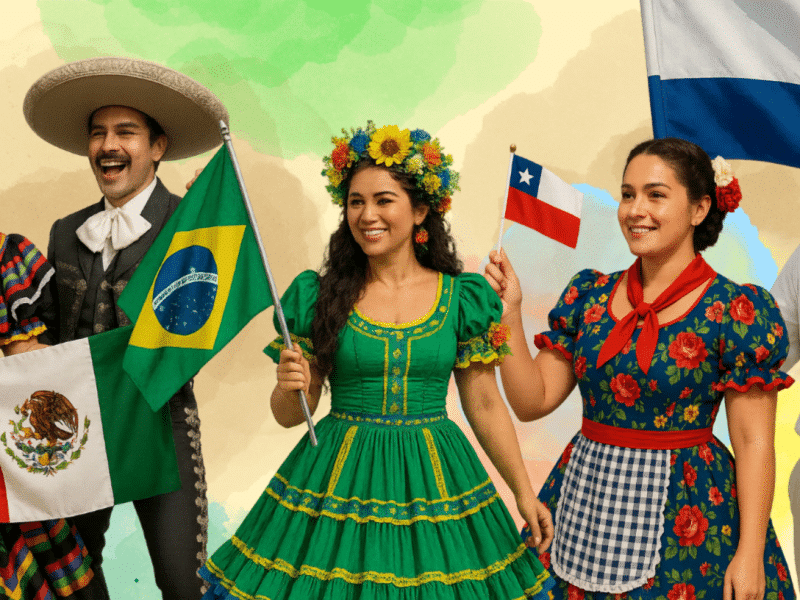Dismantling The Stereotypes: Latinas and Sex
Why is sex still such a taboo topic in many Latino households, especially for Latinas?

Whether we’re explicitly aware of it or not, machismo is still a very dominant aspect of Latino culture. While strides have been made to dismantle machismo, it has had a huge influence on societal conventions that Latinos still live by. For instance, Latina women are still held to a different standard than Latino men in every aspect, and one of those aspects is sex.
One of the main issues in most traditional Latino households is that sex is quite a taboo subject, and many parents don’t have the “sex talk” with their children. In Latino households that are more Catholic and conservative, sex is discussed in an even more limited fashion. The thought behind this approach is that if sex isn’t discussed, children may not be as interested in it. However, this approach has the opposite effect and leads to consequences like shame around sex, lack of sexual education,n and health, etc.
As sexologist Rebecca Alvarez put it in a 2022 People en Español interview, “When we don’t talk about sex growing up, or we talk about sex in a very taboo, hush-hush way, that stays with us. As adults, then we’re expected to have these great relationships, understand what to do with sex, how to manage it all, and a lot of times we don’t.” The fact is that sexual curiosity is a normal part of growing up, and education is the best guidance.
Considering that Latin American parents communicate less with their children about sex than parents of other ethnicities, having open conversations about sex can be extremely difficult, especially for Latinas, so the default most of the time is to avoid the subject altogether. This goes back to the influence of machismo and marianismo, which reinforce the belief that a woman’s purity and honor lie in her virginity. This belief is not as strictly imposed as it was, say, 50 years ago and we have female empowerment and feminism to thank for that, but it’s still subconsciously ingrained in many Latina women.
In fact, many misconceptions about sex and sexuality are subconsciously ingrained in Latina women from an early age, and those misconceptions can do more harm than good in the way Latinas approach sex. As clinical psychologist and sexologist Miren Larrazábal shared in an El País article about sexual health, “Sexuality is a very important part of health, but it is completely surrounded by false beliefs that make it difficult to have a healthy sexual life.” Since many of those misconceptions go unnoticed, yet they influence Latinas’ behavior around sex, it’s important to bring them to the forefront and challenge them.
Misconception #1: Virginity = female purity
One of the biggest misconceptions about sex in Latino culture is the equation of virginity with female purity by marianismo beliefs. This is also deeply rooted in patriarchal notions of women as property, where their worth and honor are tied to their sexual chastity. From a young age, many Latina girls are taught that their value lies in their virginity and they should wait until marriage, as if virginity were a gift to offer someone else. Deviating from that could lead to shame and judgment.
This misconception not only places undue pressure on Latina women to remain abstinent until marriage but also perpetuates harmful attitudes toward female sexuality. It reinforces the idea that women’s bodies are objects to be controlled and policed by others, rather than celebrated and respected as autonomous. Virginity as a measure of purity also overlooks the reality that our sexual history doesn’t define us.
Sexual activity or the lack thereof doesn’t define our value as women; our character, values, achievements, and contributions to society are much better measures. Latina women have been challenging the misconception of virginity = female purity, reclaiming agency over their bodies and sexuality, and must continue doing so to move the needle forward and away from marianismo beliefs that seek to hold Latinas back.
Misconception #2: Female pleasure is secondary
Within the framework of traditional Latino culture, the notion of female pleasure often takes a back seat to male satisfaction. Unfortunately, this misconception perpetuates the idea that a woman’s sexual fulfillment is less important and that female pleasure is shameful unless it’s within marriage. It’s an idea reinforced by religion, particularly Catholicism, which is still a big part of Latino culture, as well as machismo and marianismo beliefs.
The reality is that everyone, regardless of gender, deserves to experience pleasure and satisfaction when it comes to sex. Sexual pleasure doesn’t belong to men and the search for female sexual pleasure is nothing Latinas or women of any other ethnicities should be ashamed of. While there’s little research on Latina sexuality and sexual pleasure, Latina pleasure does exist and the discourse around it has been changing as more women learn to embrace their sexual pleasure and become more sex-positive.
Misconception #3: Latina women are all promiscuous
More than a misconception, this is a stereotype that has been imposed on Latina women for far too long. While it doesn’t stem from the Latino culture, it affects Latina women inside and outside of their Latino communities. This stereotype contrasts directly with purity culture in the Latino community, and it’s just as damaging.
In the media, Latinas are consistently hypersexualized and labeled as “spicy.” Far from empowering or flattering, this hypersexualization of the Latina woman is another source of shame for Latinas. Moreover, the hypersexualization of Latinas distorts public perception of them, leading to insecurities and problems like body image issues as a result of societal misconceptions. Latina women are often objectified and fetishized, reducing their sexual identity to narrow and mistaken stereotypes.
However, Latinas, like women of any ethnicity, have a range of sexual preferences and experience sexuality in different ways. The labeling of Latina women as promiscuous reinforces these stereotypes perpetuated in the media and contributes to discrimination and stigmatization. Latinas are more than these stereotypes and challenging them whenever we find them in society is one way to contribute to change. Moreover, advocating for more accurate and nuanced representation is key.
Misconception #4: Female sexual expression should be modest
It’s not uncommon for Latino households to teach Latina girls to be modest and restrained. This goes hand in hand with the idea that virginity is a measure of purity and worth. Latina women who grow up in households where both machismo and marianismo are upheld are taught to repress their sexual drives, and that sexual prowess is reserved for men. While Latino men can be sexual, Latinas must be submissive and even naive in their sexuality.
This belief stifles women’s autonomy and denies them the freedom to express their sexuality authentically. Every woman should have the agency to express her sexuality in a way that feels empowering and authentic to her, but many Latina women are discouraged from developing that agency from a very early age. Fortunately, the culture of sexual empowerment and liberation is growing in the Latino community. More and more Latina women are embracing their sexual selves, rejecting the notion of modesty as a measure of self-worth, and reclaiming their sexual agency.
While sex remains a taboo subject in many Latino households, the more conversations we have about sex in the community, the more normalized it will become. Sex is a natural part of life for men and women, and stigma doesn’t have to continue being a part of it. It’s also time for misconceptions about Latina female sexuality to go, which is why challenging them is key, starting with ourselves.




